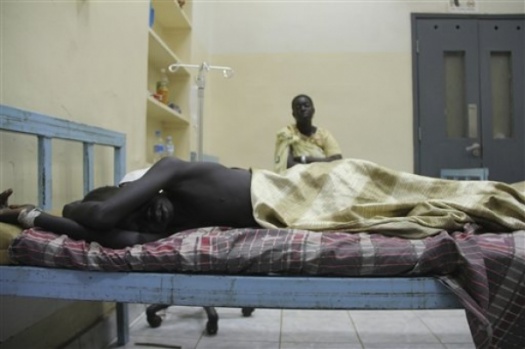
More than 100 orphans — the youngest only 1 month old — were trapped between fighting forces over the weekend when rebel troops battling Southern Sudan’s army invaded an orphanage, officials said Monday.
JUBA, Sudan (AP) — More than 100 orphans — the youngest only 1 month old — were trapped between fighting forces over the weekend when rebel troops battling Southern Sudan’s army invaded an orphanage, officials said Monday.
None of the children or the orphanage workers were harmed, but it appears that gunfire was exchanged while the children were inside the facility, said Doris Kirchebner, a spokeswoman for SOS Children’s Villages International, the aid group that runs the children’s home in the city of Malakal.
Rebel fighters battling the south’s Sudan Peoples’ Liberation Army, or SPLA, entered the facility Saturday, and the fighting began while the children and staff were still inside, she said.
"We have heard that they entered one house and occupied it and it was possible to move the children to another house," she said. "What we know is that the whole compound was surrounded by SPLA soldiers. It was not possible for anyone to get in or get out."
Orphanage director Akwoch Dok said the children have been caught in the middle of clashes before.
"It is not the first time," he said. "When it happens, the children hide under the beds so the bullets pass by."
An internal U.N. report said that several armed militants took the children hostage. While mediation efforts were taking place, the children were transferred to a hotel elsewhere in Malakal. The report said that five attackers were reported killed inside the orphanage.
Dok said he thinks the fighters gained entry to the compound through the kitchen, and that orphanage officials called the police to report it. He said southern security forces ordered the children to evacuate while the fighters were still inside the orphanage.
"It is not easy for (the children)," Martha Choat, a minister in the Upper Nile state government said by phone from the hotel in Malakal. "For the past two days they were sleeping with no blankets and bedsheets."
The youngest orphan is only 1 month, she said. The director of the orphanage went shopping Monday to buy water because "the kids are having diarrhea, they are sick, they are drinking from the river," she said.
The takeover of the orphanage came amid a spate of fighting Saturday that saw 40 rebels and two SPLA soldiers killed, said army spokesman Col. Philip Aguer.
Since its January independence referendum, Southern Sudan has seen a wave of violence that has killed hundreds. The SPLA is carrying out military operations in three counties of Jonglei state, and The Associated Press, citing internal U.N. documents, reported last week that the SPLA has made parts of three counties in Jonglei off-limits to the U.N.
The U.N. on Monday, though, called for "unhindered" access to populations affected by fighting in Jonglei and Upper Nile states. It said that many people affected by fighting remain inaccessible.
Georg Charpentier, the U.N.’s humanitarian coordinator in Sudan, said humanitarian agencies are negotiating with the SPLA for access to the no-go zone, as well as for the setting up of humanitarian corridors. The U.N. said two aid agencies have had to leave the area because of the no-go zone declaration.
After a successful January independence vote that northern Sudan said it would accept, there are clear signs that the security situation in Southern Sudan is rapidly deteriorating.
The secretary-general of the main political party in Southern Sudan, Pagan Amum, said Sunday that the south is suspending talks and diplomatic contact with northern Sudan because of allegations that the northern government is funding militias in the south. Amum said the north is trying to "destabilize" Southern Sudan and is plotting to overthrow the southern government before it declares independence on July 9.
On Monday, Amum leveled accusations against the Khartoum government for the third day in a row, alleging that the northern leadership is intent on destabilizing the south. Speaking to journalists and diplomats, including two officials from the U.S. Embassy, Amum presented documents in Arabic he said proved the north’s intentions.
Amum said the documents were from 2009 to 2011 and came from the northern ministries of defense and intelligence and from officials in Khartoum’s ruling National Congress Party and the Sudanese Armed Forces. Amum’s aides declined a request for copies of the documents, making it impossible to independently verify Amum’s claims.
The oil-rich south voted nearly unanimously to secede from the north, but there are many issues that still remain unaddressed, including the sharing of oil revenues, the status of southerner and northerner minorities living on both sides of the border, and who controls the disputed border region of Abyei, a fertile area near large oil fields.
Associated Press reporter Jason Straziuso reported from Nairobi, Kenya.
Copyright 2011 The Associated Press.
(AP Photo/Maggie Fick)